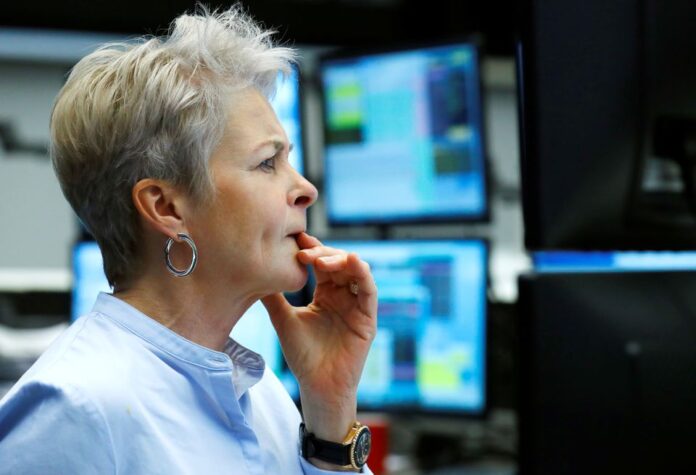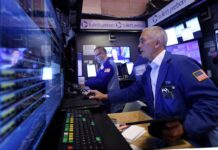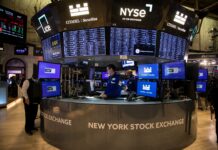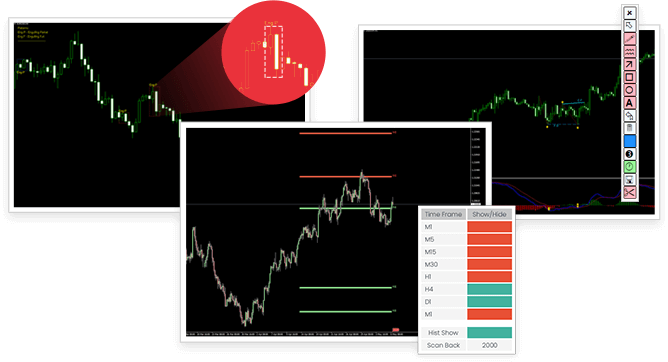
Shares worldwide halted their January rally on Monday, pausing for breath at the start of an agenda-setting week of central bank rate hikes and data releases that will clarify if progress has been made in the battle against inflation.
Investors expect the Federal Reserve will raise rates by 25 basis points on Wednesday, followed the day after by half-point hikes from the Bank of England and European Central Bank, and any deviation from that script would be a real shock.
Europe’s benchmark STOXX index fell 0.8% on Monday morning, echoing a slight dip in MSCI’s broadest index of Asia-Pacific shares outside Japan (.MIAPJ0000PUS), which has surged 11% in January so far as China’s reopening bolsters sentiment.
The U.S. Nasdaq index is likewise on course for its best January since 2001, a rally that will be tested by earnings updates from tech giants this week.
U.S. stocks were set to follow the nervous Monday mood with S&P 500 futures down 1% and Nasdaq futures falling 1.3%, as investors await guidance later in the week on the Federal Reserve’s policy.
Analysts expect a hawkish tone suggesting that more needs to be done to tame inflation.
“With U.S. labour markets still tight, core inflation elevated and financial conditions easing, Fed Chair Powell’s tone will be hawkish, stressing that a downshifting to a 25bp hike doesn’t mean a pause is coming,” said Bruce Kasman, chief economist at JPMorgan, who expects another rise in March.
“We also look for him to continue to push back against market pricing of rate cuts later this year.”
There is a lot of pushing to do given futures currently expect rates to peak at 5% in March and to fall back to 4.5% by year-end.
Europe offered a brisk reminder that the fight against rising prices is far from over, as bond yields in the region rose sharply on Monday in the wake of stronger-than-expected Spanish inflation data.
The data showing inflation rose 5.8% year-on-year in January, against expectations of 4.7%, pushed up the zone’s benchmark German 10-year government bond yield 7 basis points (bps) to 2.3190%, its highest since Jan. 10.
Italian and Spanish yields also inched up.
The dollar index was flat ahead of the week’s key data, on course for a fourth straight monthly loss of more than 1.5% on growing expectations that the Fed is nearing the end of its rate-hike cycle.
APPLE’S CORE
Yields on 10-year notes have fallen 33 basis points so far this month to 3.50%, essentially due to easing financial conditions even as the Fed talks tough on tightening.
That dovish outlook will also be tested by data on U.S. payrolls, the employment cost index and various ISM surveys.
Reading on EU inflation could be important for whether the ECB signals a half-point rate rise for March, or opens the door to a slowdown in the pace of tightening.
As for Wall Street’s recent rally, much will depend on earnings from Apple Inc (AAPL.O), Amazon.com (AMZN.O), Alphabet Inc (GOOGL.O) and Meta Platforms (META.O), among many others.
“Apple will give a glimpse into the overall demand story for consumers globally and a snapshot of the China supply chain issues starting to slowly abate,” wrote analysts at Wedbush.
“Based on our recent Asia supply chain checks we believe iPhone 14 Pro demand is holding up firmer than expected,” they added. “Apple will likely cut some costs around the edges, but we do not expect mass layoffs.”
Market pricing of early Fed easing has been a burden for the dollar, which has lost 1.6% so far this month to stand at 101.85 against a basket of major currencies.
The euro is up 1.5% for January at $1.0878 and just off a nine-month top. The dollar has even lost 1.3% on the yen to 129.27 despite the Bank of Japan’s dogged defence of its ultra-easy policies.
The drop in the dollar and yields has been a boon for gold, which is up 5.8% for the month so far at $1,930 an ounce.
The precious metal was flat on Monday ahead of the slew of key central bank moves and data releases.
China’s rapid reopening is seen as a windfall for commodities in general, supporting everything from copper to iron ore to oil prices.
Oil steadied on Monday after earlier losses, with prices bolstered by rising Middle East tension over a drone attack in Iran and hopes of higher Chinese demand.
Brent crude rose 10 cents, or 0.12%, to $86.76 a barrel by 1200 GMT while U.S. West Texas Intermediate crude added 4 cents, or 0.05%, to $79.72.





















